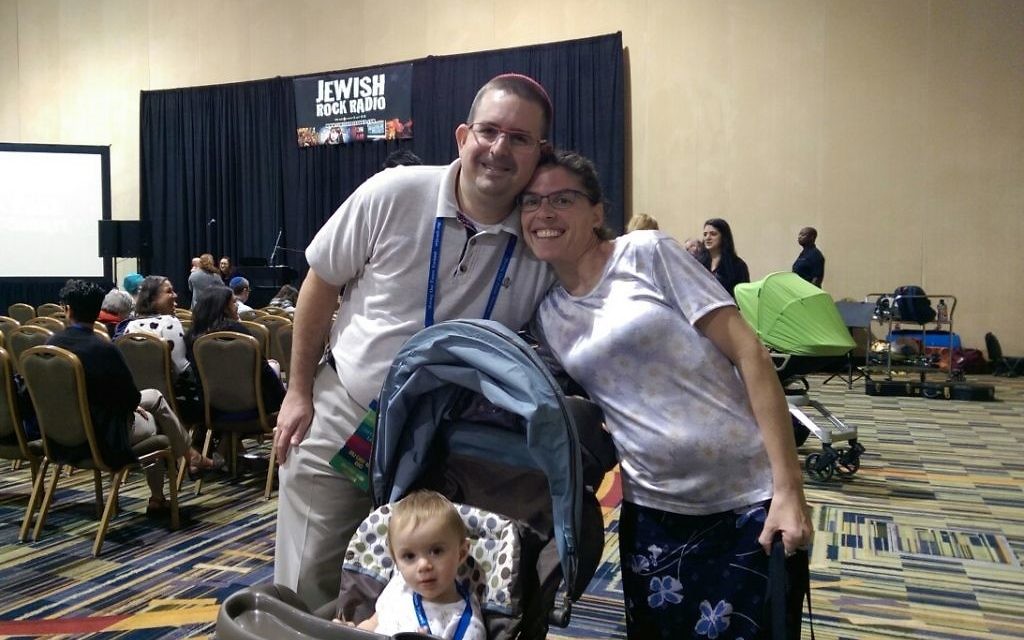Georgians Shape URJ Biennial
Rabbis, lay leaders share insights, bring home engaging ideas
The Union for Reform Judaism Biennial in Orlando from Nov. 4 to 8 featured several noteworthy moments for the more than 5,000 Jews who attended, including dozens from the Atlanta area.
At the morning plenary session Nov. 5, the URJ unanimously passed a resolution that calls on Reform synagogues to take a welcoming stance toward transgender people. The resolution suggests that congregations create gender-neutral bathrooms, increase training for staff on LGBT issues and eliminate gender-specific pronouns on name tags.
Get The AJT Newsletter by email and never miss our top stories Free Sign Up
A few hours after the resolution was passed, the URJ president, Rabbi Rick Jacobs, delivered his presidential address at an evening plenary session. Rabbi Jacobs covered a range of topics but

spent most of his address talking about the growing rift between Israeli policymakers and Reform Jews in America.
“The current Israeli government is unlikely to permit advances in religious freedom such as civil marriage, equal funding of non-Orthodox institutions and reducing the power of the ultra-Orthodox Chief Rabbinate,” Rabbi Jacobs said. “Our movement, with its alternative to the rigid and insular Judaism that permeates Israeli public life, must remind the Israeli state about the power and wisdom of a pluralistic approach to Jewish life.”
Rabbi Jacobs, however, was mostly positive in his support of the Jewish state and added that the safety and security of Israel should be a primary goal of the Reform movement, which is the largest Jewish denomination in North America.
The engagement of a new generation of Reform Jews was also a topic of note for the URJ president. He called for a renewed push to bring in young Jews through tikkun olam (repairing the world).
“Millennials more than anything want to make a difference,” he told the crowd. “Tikkun olam should be the initial gateway into a life of Jewish commitment.”
Throughout the biennial, Reform Jews from Georgia participated in Torah study and learning sessions and hosted workshops.
Rabbi Rachael Bregman of Temple Beth Tefilloh in Brunswick traveled to Orlando with a delegation of five from her congregation, including her 6-month-old daughter, one of the youngest attendees.
“There are an endless amount of sessions going on here with great resources for us,” she said. “Particularly as a small congregation. We only have 75 families, so to access resources for the entire Union for Reform Judaism is amazing and special.”

Rabbi Peter Berg of The Temple was one of many Atlanta clergy members who made the trip. He arrived Nov. 3 with a 15-member delegation from his Midtown congregation, including President Jonathan Amsler and Executive Director Mark Jacobson.
On Nov. 5, Rabbi Berg led a session to discuss the next steps in racial justice after 200 rabbis marched with the NAACP from Selma, Ala., to Washington, D.C., Aug. 1 to Sept. 15. Amsler sat on a panel later that day discussing efficient governance models for large congregations, and Jacobson participated in a panel focusing on the URJ’s policy of audacious hospitality.
The next day, Rabbi Berg sat on a panel hosted by Atlanta Rabbi Dan Medwin on “Sacred Upgrading: New Techs for Ancient Texts.”
Rabbi Medwin, who is the publishing technology manager for the Central Conference of American Rabbis, was on hand to explain the latest advances in visual tefillah, prayer book apps and e-books.
“Upgrading our sacred text containers is something that we’ve been doing since the beginning of Jewish history,” Rabbi Medwin said. “Each time we do it, there are new features that are available which give us better access to the texts. The biggest thing we want congregations to do is be willing to experiment.”
Temple Kol Emeth Rabbi Erin Boxt made the trip from East Cobb to Orlando with his wife, Batya, and their daughters, Carlie and Danika. Rabbi Boxt eschewed many of the sessions and workshops in favor of one-on-one meetings and networking opportunities.
“It’s been amazing here,” Rabbi Boxt said. “We’ve run into so many of my colleagues and friends. Unfortunately I haven’t had time to go to many sessions so far because I’m constantly talking to people and bouncing ideas off each other, but what an amazing event to have so many of my best friends and family all in one place.”
The Kol Emeth delegation also got to see member Blair Marks installed for her second year as the president of Women of Reform Judaism.

Rabbi Ron Segal of Temple Sinai, who traveled to Orlando with a delegation that included congregant Jan Epstein and Youth Director Molly Okun, said the biennial gave him a chance to explore ways his congregation can tackle social justice.
“I have found the experience here to be profoundly engaging,” Rabbi Segal said. “I’ve spent a lot of time here focusing on the movement towards racial justice, and I am inspired to help bring our congregation into that battle for racial equality. I think that is truly one of the great social justice issues of our day as a Jewish people and as a Reform movement.”
During the biennial, Temple Sinai and The Temple were named exemplar congregations for the URJ’s Disabilities Inclusion Learning Center. To be awarded the distinction, a congregation must excel in one or more areas of inclusion: Advocacy & Community Partnerships, Architectural & Physical Accommodations, Early Childhood Education, and Worship.
Epstein received the recognition for Temple Sinai, and Amsler accepted on behalf of The Temple.





comments